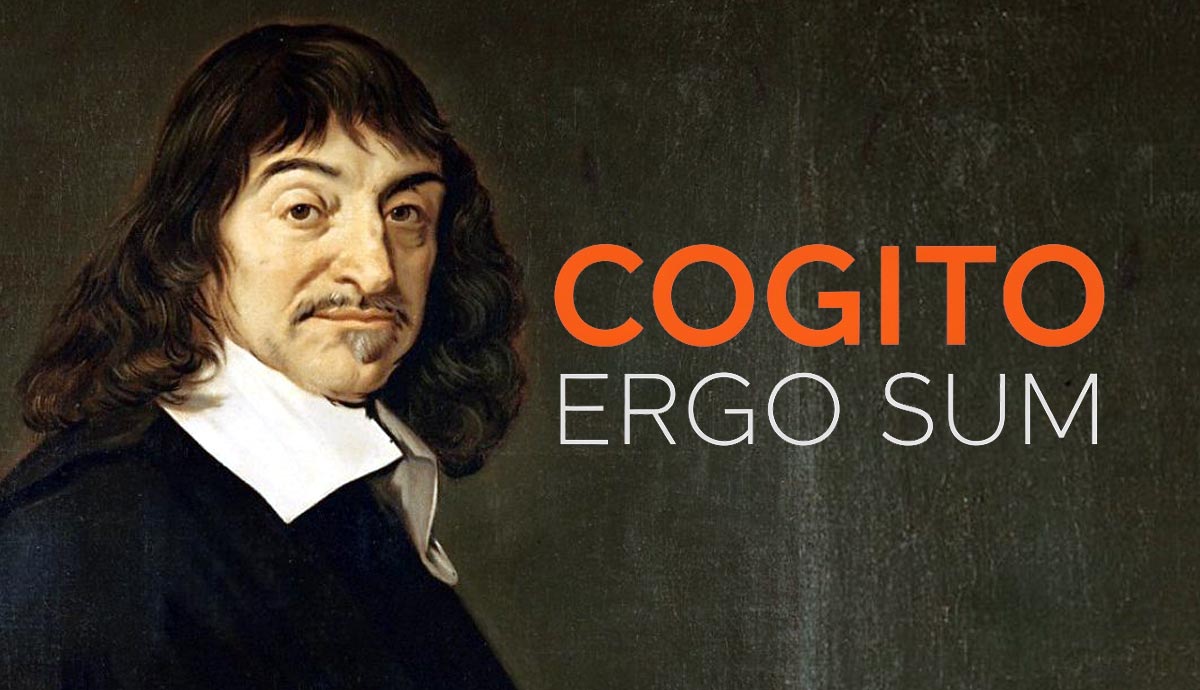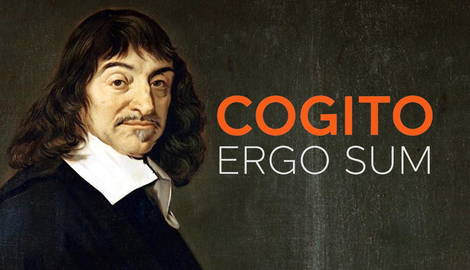
“Cogito, ergo sum”, Latin for “I think, therefore I am”, is René Descartes’ most celebrated and influential contribution to humanity. The statement was the prized conclusion of his famous journey of radical skepticism, one that served as the solid foundation of his philosophy. In this article, we uncover why “I think, therefore I am” was the only statement that withstood Descartes’ radical doubt in his quest for certainty and how it led to a paradigm shift that shaped modern philosophy.
René Descartes on Doubt

René Descartes doubted everything because he was seeking certainty. He discovered that everything he held to be true could be fallible, even his sense perception could not be trusted. Descartes was after a knowledge that cannot be obstructed by doubt, a perfect knowledge. He wanted certainty, and to reach certainty, he had to question everything. Descartes’ method, known as Cartesian doubt, was to systematically doubt all his knowledge claims and set aside anything susceptible to doubt, until a claim that cannot be doubted can serve as the foundation of his knowledge system.

Indeed, Descartes doubted everything that can be doubted. He even went as far as hypothetically supposing that a powerful and cunning demon was deceiving all his judgments of the external world. In Meditations On First Philosophy, Descartes declared that “I will suppose that sky, air, earth, colors, shapes, sounds, and all other external things are nothing but the illusions of my dreams, set by this spirit as traps for my credulity” (Descartes, 1641). Assuming that the external world was an illusion cast by a deceiving demon, he even suspended belief in the existence of his physical body. Under the grips of radical doubt, Descartes questioned whether he could doubt his own existence, but found that he could not. The certitude he sought culminated in his dictum, “I think, therefore I am”.
“I Think, Therefore I am” Concluded René Descartes’ Journey of Radical Doubt

“I think, therefore I am” concluded Descartes’ journey of radical doubt because it was the only knowledge claim that could not be doubted. In attempting to doubt his own existence, he found that the very act of doubting his existence proved his existence. His doubting thoughts pointed to his existence as a thinking subject. Even if the entire universe was an illusion cast by a deceiving demon, he must necessarily exist as a subject being deceived. As Descartes reflected, “There is therefore no doubt that I exist, if deceives me; and let him deceive me as much as he likes, he can never cause me to be nothing, so long as I think I am something” (Descartes, 1641). The very fact that Descartes was thinking proved that he existed. “I think, therefore I am” was the only knowledge that withstood the deceiving demon test. Through the cogito ergo sum, Descartes finally found certainty.

Descartes first wrote his famous dictum, “I think, therefore I am”, in his earlier work, Discourse On The Method:
“I became aware that, while I decided thus to think that everything was false, it followed necessarily that I who thought thus must be something, and observing that this truth: I think, therefore I am, was so certain and so evident that all the most extravagant suppositions of the skeptics were not capable of shaking it, I judged that I could accept it without scruple as the first principle of the philosophy I was seeking” (Descartes, 1637).
As the only certainty, “I think, therefore I am” became the foundation of Descartes’ philosophy, from which he proceeded to demonstrate the validity of all other knowledge claims. In Meditations On First Philosophy, he reformulated it as “I am, I exist”, and attempted to fathom the nature of his subjectivity, namely, what is the “I am” that exists? (Descartes, 1641). According to Descartes, the ‘I am’ is “a thing that thinks” (Descartes, 1641). As long as one thinks, one exists.
“I Think, Therefore I am” Resulted in Mind-Body Dualism

In Cartesian philosophy, “I think, therefore I am” resulted in mind-body dualism by establishing the mind as a distinct substance from the body. The cogito ergo sum establishes existence as ontologically anchored in the mind and its properties. Therefore, one’s corporeal and material being is not necessary to conceive of one’s existence, which is only dependent on the mind. In Descartes own words, “I was a substance, of which the whole essence or nature consists in thinking, and which, in order to exist, needs no place and depends on no material thing; so that this ‘I’, that is to say, the mind, by which I am what I am, is entirely distinct from the body, and even that it is easier to know than the body, and moreover, that even if the body were not, it would not cease to be all that it is” (Descartes, 1641).
“I Think, Therefore I am”: Influence on Modern Philosophy

Descartes’ dictum, “I think, therefore I am”, resulted in a paradigm shift and served as the foundation of modern philosophy. By establishing the thinking subject as the grounds of knowledge, Cartesian philosophy removed the authority of external sources of knowledge, such as the Church, medieval scholasticism, and empiricism. Effectively, the cogito, as the unshakable foundation of philosophy, led to the unprecedented rise of rationalism, where reason is considered the primary source of credible knowledge.
Cartesian philosophy also reshaped theories of consciousness by establishing self-awareness (i.e. awareness of one’s internal mental activities) as the fundamental ground of one’s existence. Most importantly, the mind-body dualism theory, known as Cartesian dualism, gave rise to continuous debates on the nature of the mind and its relationship to the physical body. Overall, “I think, therefore I am” is considered by historians to mark the beginning of modern philosophy thanks to its lasting influence in many branches of philosophy. The Cartesian cogito is why René Descartes is known today as the father of modern philosophy.










